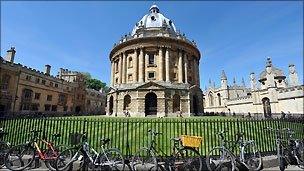Oxford University reveals interview questions
- Published

The university wants to show applicants the type of questions they might face
"What is 'normal' for humans?"
Oxford University has revealed some of the interview questions faced by the last crop of applicants, who are starting courses this autumn.
The university says it wants to "demystify" the interview process - and to give potential applicants an idea of what to expect.
The use of such thought-provoking and open-ended questions is designed to make it less easy to rehearse answers.
The university has published questions asked in a range of subjects - explaining how they hoped applicants might have responded and emphasising that there might be many different answers.
Last year's round of interviews, held in December, involved questions being put to about 10,000 applicants.
Dickens of a question
The idea is not to ask trick questions, say staff who carry out interviews, but to find how applicants think creatively and insightfully about an open-ended question.
This might mean some "strange sounding" questions, but it is meant to take away any advantage from pupils who have been expensively-coached in reciting their academic, social and sporting achievements.
A small industry has grown up around trying to get the most sought-after university places - and the Oxford interviewers want to keep one step ahead and see how applicants can think for themselves.
Would-be English students were asked: "Why do you think an English student might be interested in the fact that Coronation Street has been running for 50 years?"
This question was designed to get students thinking about how ideas of storytelling, depicting characters and keeping readers on the edge of their seats can work across different types of media.
For an extra flourish, candidates might have talked about how "popular" writers, such as Dickens, might later become part of the literary canon.
Theology students were faced with an ethical puzzler: "Is someone who risks their own life (and those of others) in extreme sports or endurance activities a hero or a fool?"
The interviewer said "we always want to find issues that enable us to see how a student is able to handle and unpick a question".
"What we found with this question is that it did manage to open what is a stressful occasion into a real discussion, and we want to offer places to gifted candidates who are willing to think out loud with us in tutorials, and in a college community, whilst they are still explorers into truths."
'Anxiety provoking'
Psychology students were delivered a question that was as short as it was profound.
"What is 'normal' for humans?"
The interviewer says this is a way of steering candidates back to the point that psychology is mostly about normal behaviour, not abnormal.
"In part this is because of a suspicion that potential undergraduates are attracted to psychology to help them study forms of human life they find strange (neuroses, psychoses, parents)."
The interviewer then hoped that applicants would get into the knotty business of defining normality - and how this might relate to "abnormality and eccentricity".
Mike Nicholson, director of undergraduate admissions at Oxford University, says the university wants to lift any veil of secrecy over the interview process.
It wants to show the type of question that might confront applicants - and to emphasise that these conversations will be about academic questions, and will not be a chat about sports and hobbies.
"There are many myths surrounding Oxford interviews, and they can be the most anxiety-provoking part of the Oxford application process for students," says Mr Nicholson.
"These questions show that the interviews are not designed to see how quickly students get the 'right' answer or show off specialist knowledge, but to gauge how they respond to new ideas."